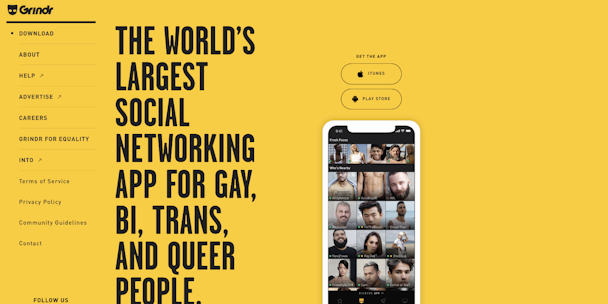Why Grindr could be the next media powerhouse
With all the commotion surrounding the Trump administration’s decision to force the Chinese holding company Beijing Kunlun Tech to sell Grindr on the basis on national security or cease US operations, there is one important detail that no one is talking about: Grindr has become the undisputed, most successful, and largest gay media company in the world.

With engagement levels that are twice that of the second most popular platform, Instagram, Grindr is a cash cow with 95% brand awareness in the LGBTQ community. Although the awareness is not all positive, Grindr has the potential to turn that around. It has become an international behemoth, and although fraught with many of its own media-related challenges, it could be the most valuable media acquisition of 2019. In addition, the platform is likely to sell at a discount given the US government’s recent ultimatum and the likelihood that Kunlun will sell it at auction.
Gay culture has become a mainstream moneymaker for major media companies. Television programs regularly include LGBTQ characters as part of their ensemble casts; shows such as RuPaul’s Drag Race are popular and profitable. LGBTQ content has blown up on streaming services, with shows like Netflix’s QueerEye, Riverdale, and Grace and Frankie.
Yet, despite the increase in LGBTQ content hitting mainstream media, we are losing our unique voice. The number of LGBTQ media companies is dwindling. INTO, a publication dedicated to global queer voices by Grindr, shut down less than two years after launching; Pride Media is going through hardships; Logo was converted into a channel of reruns; and BuzzFeed and HuffPo have significantly cut their LGBTQ coverage.
What’s astonishing about this is that the LGBTQ market has enormous buying power for its size, boasting over $100 billion in the US by some estimates, and has an outsized influence on mainstream media and culture. Yet, there are virtually no media organizations dedicated to the community. Where are LGBTQ voices in 2019? And could they live within Grindr?
Grindr has completely changed the way LGBTQ people connect. The app enables the community to instantly find one another on a global scale and with location accuracy. It became a powerful tool to mobilize a largely suppressed community during a time when cultural acceptance was relatively low. Some argue that Grindr helped many in the community come out, find relationships and friends, and build support systems. And while we may take the app for granted in 2019, it was revolutionary when it was founded.
Today the app is a community of 27 million and is labeled as the single largest LGBTQ community in the world. Yes, the product needs an upgrade, a rebrand, and a tizzy of security and moderation features to clean up its overly sexualized community and poor media relations. Even so, Grindr could still be one of the most important media acquisitions of 2019. The key question is, “Who’s going to give it the right TLC?”
Grindr’s acquirer should be a leading media company rather than a dating conglomerate. The potential to scale its impact, improve profitability, and reposition the brand is better suited for a corporation such as Comcast/NBC or Viacom, or even a Verizon, Netflix, or AT&T. These companies are brand-building geniuses. Think of the hundreds of brand properties they produce each year, from feature films to documentaries and miniseries, to reality TV, comedies, dramas, and more. Once rebranded and polished, there is no reason Grindr the app could not expand its product offerings to OTT videos series, podcasts, and the like.
It could become a one-stop shop for LGBTQ content consumption, where users could meet new people, listen to music, watch videos, read editorial, download podcasts, and more. In addition, media companies could promote their own content to the app’s massive and influential audience. If done correctly, Grindr could look more like Bumble, rather than a single feature-dating app.
Grindr the app could be just the beginning. If the right media company acquires it and repositions it as the leading LGBTQ media company, the brand could conceivably expand into other businesses and lend its global LGBTQ reach to film, TV production, radio, and product licensing. I could see Grindr producing LGBTQ content for Viacom or Verizon, producing co-branded content for CheddarTV, and extending its brand into undergarments, bathing suits, and more.
With a 95% brand awareness within the LGBTQ community, Grindr is only scratching the surface of its community impact and business potential.
While many in the industry believe the company will sell between $250m – $500m, there is no reason why Grindr couldn’t evolve to become a $5bn – $10bn business. It currently generates hundreds of millions of dollars in revenue, and still has the majority of the world to penetrate — and that’s just with a single feature app.
All this is wishful thinking unless Grindr can overcome its stigma as a scandalous hook-up app. In doing this, it will make it much more valuable to a publicly traded company because more advertisers will take notice.
Once Grindr officially goes on the market, I expect to see a leading American media company buy it, breathe new life into it, and build it out to its potential as a true media powerhouse.
Adam Cohen Aslatei is former managing director of and current advisor to Chappy, Bumble’s gay dating app

